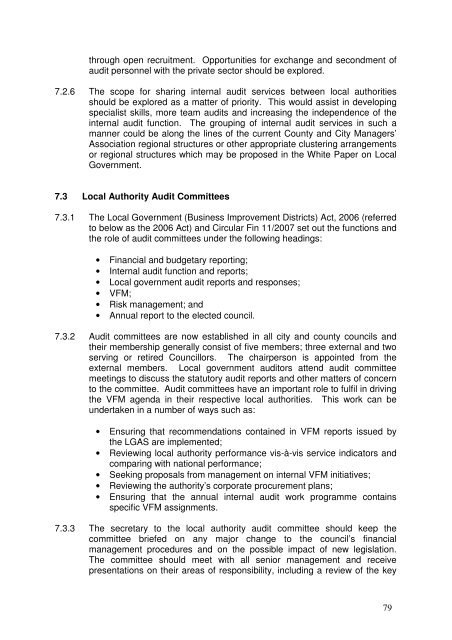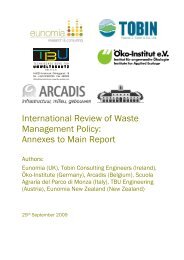Report of the Local Government Efficiency Review Group
Report of the Local Government Efficiency Review Group
Report of the Local Government Efficiency Review Group
Create successful ePaper yourself
Turn your PDF publications into a flip-book with our unique Google optimized e-Paper software.
through open recruitment. Opportunities for exchange and secondment <strong>of</strong><br />
audit personnel with <strong>the</strong> private sector should be explored.<br />
7.2.6 The scope for sharing internal audit services between local authorities<br />
should be explored as a matter <strong>of</strong> priority. This would assist in developing<br />
specialist skills, more team audits and increasing <strong>the</strong> independence <strong>of</strong> <strong>the</strong><br />
internal audit function. The grouping <strong>of</strong> internal audit services in such a<br />
manner could be along <strong>the</strong> lines <strong>of</strong> <strong>the</strong> current County and City Managers’<br />
Association regional structures or o<strong>the</strong>r appropriate clustering arrangements<br />
or regional structures which may be proposed in <strong>the</strong> White Paper on <strong>Local</strong><br />
<strong>Government</strong>.<br />
7.3 <strong>Local</strong> Authority Audit Committees<br />
7.3.1 The <strong>Local</strong> <strong>Government</strong> (Business Improvement Districts) Act, 2006 (referred<br />
to below as <strong>the</strong> 2006 Act) and Circular Fin 11/2007 set out <strong>the</strong> functions and<br />
<strong>the</strong> role <strong>of</strong> audit committees under <strong>the</strong> following headings:<br />
• Financial and budgetary reporting;<br />
• Internal audit function and reports;<br />
• <strong>Local</strong> government audit reports and responses;<br />
• VFM;<br />
• Risk management; and<br />
• Annual report to <strong>the</strong> elected council.<br />
7.3.2 Audit committees are now established in all city and county councils and<br />
<strong>the</strong>ir membership generally consist <strong>of</strong> five members; three external and two<br />
serving or retired Councillors. The chairperson is appointed from <strong>the</strong><br />
external members. <strong>Local</strong> government auditors attend audit committee<br />
meetings to discuss <strong>the</strong> statutory audit reports and o<strong>the</strong>r matters <strong>of</strong> concern<br />
to <strong>the</strong> committee. Audit committees have an important role to fulfil in driving<br />
<strong>the</strong> VFM agenda in <strong>the</strong>ir respective local authorities. This work can be<br />
undertaken in a number <strong>of</strong> ways such as:<br />
• Ensuring that recommendations contained in VFM reports issued by<br />
<strong>the</strong> LGAS are implemented;<br />
• <strong>Review</strong>ing local authority performance vis-à-vis service indicators and<br />
comparing with national performance;<br />
• Seeking proposals from management on internal VFM initiatives;<br />
• <strong>Review</strong>ing <strong>the</strong> authority’s corporate procurement plans;<br />
• Ensuring that <strong>the</strong> annual internal audit work programme contains<br />
specific VFM assignments.<br />
7.3.3 The secretary to <strong>the</strong> local authority audit committee should keep <strong>the</strong><br />
committee briefed on any major change to <strong>the</strong> council’s financial<br />
management procedures and on <strong>the</strong> possible impact <strong>of</strong> new legislation.<br />
The committee should meet with all senior management and receive<br />
presentations on <strong>the</strong>ir areas <strong>of</strong> responsibility, including a review <strong>of</strong> <strong>the</strong> key<br />
79
















